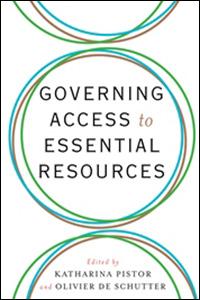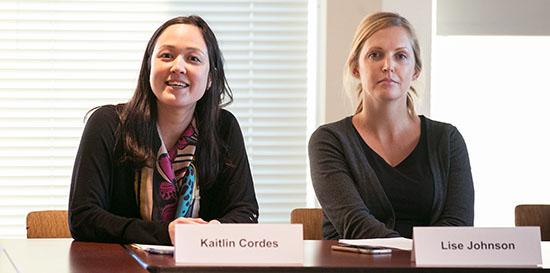Governing Access to Essential Resources
A New Book by Columbia Law School's Katharina Pistor, and a Report by the Columbia Center on Sustainable Investment, Asks How the World Can Provide Everyone With the Resources Necessary for Survival
New York, February 11, 2016—Columbia Law School Professor Katharina Pistor argues a just world must ensure equitable access to increasingly scarce essential resources, like fresh drinking water and food, which everyone needs to survive but are often controlled under private-property rights.
Pistor, the Walter E. Meyer Research Professor in Law & Social Problems and the Michael I. Sovern Professor of Law, lays out various strategies and arguments to accomplish this goal in a new book, Governing Access to Essential Resources (Columbia University Press), which she edited with Olivier De Schutter, a Belgian legal scholar specializing in economic and social rights. De Schutter served as the United Nations Special Rapporteur on the right to food from 2008 to 2014 and was a former visiting professor at Columbia Law School.
The pair’s introductory essay provides a framework for the insights and examples found in 16 contributions from an international roster of legal scholars, environmentalists, and public policy experts. Among the topics considered are the operations of common law, the struggle over property rights in China, and access to water in Mumbai’s slums and in America’s western states. Pistor and De Schutter stress that these examples show context matters when determining what resources can be deemed “essential” and what government and legal tools might be employed to ensure universal access.
| Professor Katharina Pistor |
At a Jan. 21 event to mark the book's release, Pistor began by citing the writer and scientist Garrett Hardin, whose 1968 article “The Tragedy of the Commons” pointed out that individuals acting in their own self-interest will hurt the best interests of everyone by depleting a common resource. He believed that only transferable property rights aligned interests with the real value of limited resources.
“Yes, we understand that without clear applications of property rights we have what Hardin called 'the tragedy of the commons,’” Pistor said. “We understand the benefits of private property rights, but we also want to talk about the tragedy of exclusion.
“In order to clearly allocate property rights, all the others who depend on the commons can no longer have access on the same terms. They have to bargain, and other regimes have to be put into place. We cannot tolerate this when it comes to essential resources.”
Before introducing a panel of speakers, Pistor called on Kaitlin Cordes ’08 and Lise Johnson LL.M. ’09 of the Columbia Center on Sustainable Investment (CCSI), which sponsored the book release event with the Law School’s Center on Global Legal Transformation. Pistor is the CGLT’s director.
Cordes and Johnson gave a preview of an upcoming report, “Land Deal Dilemmas: Grievances, Human Rights, and Investor Protection,” which CCSI will release next month. Cordes, the center’s head of land and agriculture, discussed a range of grievances that can arise from foreign investments in large land-based concessions in agriculture and forestry, and what legal and economic consequences stand in the way of governments addressing these grievances.
Johnson, the center’s head of investment law and policy, paid special attention to the implications of the 3,300 investment treaties currently signed by countries around the world.
These agreements usually contain requirements for disputes to be resolved by investor-state arbitration tribunals, allowing investors to sue governments for treaty violations and, in the process, affecting the scope and strength of property rights protections.
A second panel took on a variety of related issues, questioning the suitability of existing pricing mechanisms for accessing essential resources and whether markets contribute to scarcity and exclusion. Other speakers included:
- Nikhil Anand, assistant professor of anthropology at the University of Pennsylvania;
- Richard Brooks, the Charles Keller Beekman Professor of Law at Columbia Law School;
- Jorge H. Kamine, a former World Bank attorney who focuses on international energy and infrastructure projects at Skadden, Arps, Slate, Meagher & Flom in Washington, D.C.
- Susan Karamanian, the associate dean for international and comparative legal studies at the George Washington University Law School; and
- Peter Rosenblum LL.M. ’92, a professor of international law and human rights at Brad College and a former clinical professor of human rights at Columbia Law School.
More information about the book Governing Access to Essential Resources can be found on the website of Columbia University Press.


